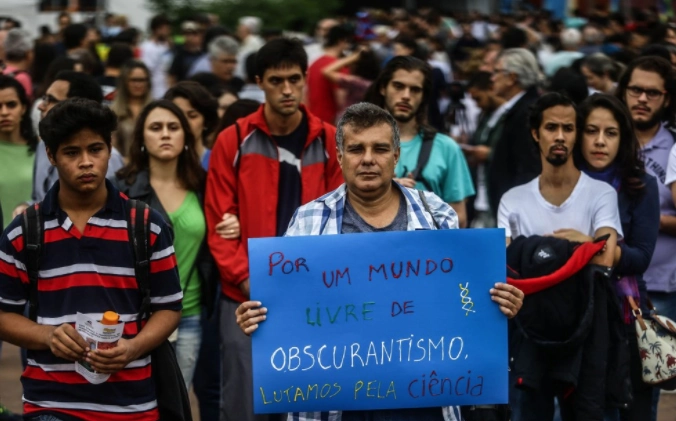In the last three years, investments in Science, Technology, and Innovation (ST&I) has decreased in Latin America, concomitant to the expansion of discussions and actions in defense of an open scientific, technological, and innovation production. This means that there is a strong movement to break the backbone of current knowledge production, based on capitalization and monopolization of knowledge by large publishing groups, corporate in nature, which are based in more developed countries. As a consequence of the release of these blockages, public participation in the directions of ST&I is valued.
The idea of open scientific data in relation to ST&I was born when preparations were being made for the International Year of Geophysics, sponsored by the UN General Assembly, between the years 1957 and 1958. In 2004, the Organization for Economic Cooperation and Development (OECD) formalized a declaration that all archival data produced from public funding should be made available free of charge.
Open data applied to social inclusion
As defined by the Open Knowledge Foundation, “information is open if anyone is free to access, use, modify, and share it – subject, at most, to measures that preserve provenance and openness”. However, researcher Anne Clinio points to conflicting perspectives on this issue in LA.
According to her, “[there are] at least two contending perspectives: the first fosters a utilitarian view of science in terms of greater efficiency, productivity, and competitiveness; the second turns to issues such as rights assurance, cognitive justice, and social justice.”
The valorization of open data can be an important changing point to dynamize the socioeconomic situation in Latin America. i.e., act effectively to meet the rights of social inclusion. Although it is a topic under theoretical and practical dispute, the production of knowledge through open data presents itself in a context that brings together: a low degree of political participation, coupled with low levels of business investment in Research and Development, witnessed by a neoliberal wave that insists on weakening the already weakened social and economic systems.
Therefore, the quality of products, services, and processes will only be improved when society achieves a higher standard of living, material conditions of existence are met, and basic social issues are solved. It is no use thinking about emerging technological applications without first transforming mentalities and ways of acting in society that are based on an economic model of excessive exploitation of natural resources. This is of no use if most of the society is pressed by basic day-to-day needs, and is not stimulated to think critically.
Despite advances in the theme in Latin America, considering the development of repositories of scientific data, Latin American collaboration in open data still depends on regionally structured governance, as it needs a normative framework for the management of research data. Examples of repositories, which could be integrated in the near future are: IBICT, RNP and CNPq agreement, in Brazil; UAM Data Portal, in Mexico; Dataverse repositories; and Re3data.
To this end, the context needs to be understood by the professional who will make the diagnosis in the forms of information production and knowledge dissemination. Factors inherent to the actions, aiming at social transformation, must involve methods, techniques, and tools oriented to the evaluation of social and economic conditions, and have the capacity to produce scientifically qualified and open data, publicly accessible for its reuse with the objective of improving the knowledge produced.
But this must be done symmetrically, valuing access to the commons, with protection from the unequal practices of traditional modern science. This would also allow the inclusion of knowledge based on traditional knowledge, breaking the barriers imposed by the hegemonic Eurocentric ST&I.
This would allow other perspectives to be outlined in a participatory environment, with greater interaction between community representatives and decision-makers, in which the researcher acts as a facilitator and decoder of research production and results. Open data experiences are fundamental so that other researchers or decision-makers can reuse, re-signify, and reorient them because the transformation of social dynamics is constant and the actions to understand them need to be in tune with reality.
Examples from around the world
Practical examples of open data tools can be found in the many institutional repositories around the world. The European Open Science Cloud (EOSC), under the European Union’s Horizon 2020 Research and Innovation Program, shows how decisive investment with the aim of exchanging knowledge without cost barriers is for research, innovation, and education.
In Latin America, the report prepared for the Latin America and the Caribbean Open Science Forum, in 2018, entitled: “Transforming our region: Science, Technology and Innovation for Sustainable Development”, attests to the importance of open scientific data for the social transformation of the region and opens the possibility of growth of this knowledge sharing modality.
A good example of continental articulation, which seems to work efficiently even in moments of acute political crisis, is the area of public health research (Unasur-Health, PAHO, etc.). The exchange of inter-institutional technical and scientific information can inspire more solid and continuous ST&I promotion practices, as State policies and not only through government initiatives.
The advanced discussions on Open Data are also an indication that the continent has an outstanding and pioneering role in the proposals advocated by the Panama Declaration on Open Science, in 2018, and in the actions in defense of democratic access to scientific knowledge.
There are unquestionable priorities regarding the implementation of ST&I policies and this is linked to the iniquitous and contradictory material conditions of existence of the Latin American population. So, it is primordial to solve their basic social necessities. Thus, the transformation necessarily involves redesigning new development strategies that consider research, education, and innovation as fundamental elements for achieving full, fair, inclusive, and diverse citizenship.
Translated from Portuguese by Janaína Ruviaro da Silva













